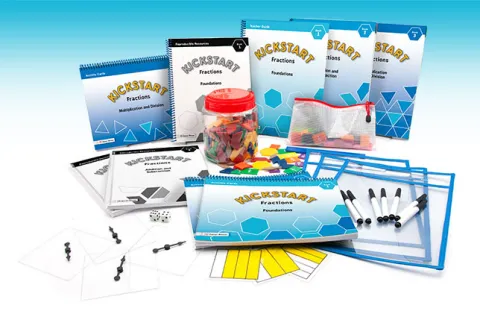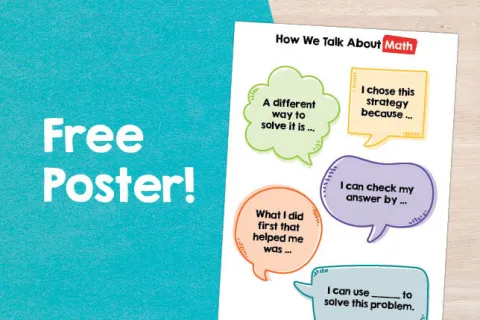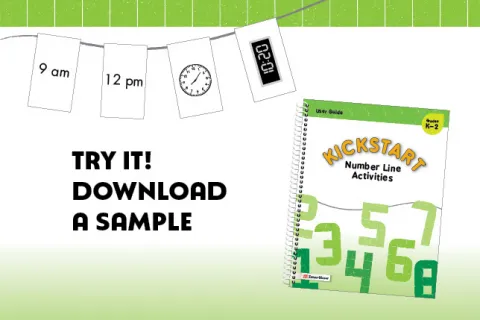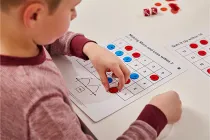
Antidotes to Math Anxiety: Confidence, Curiosity, and Engagement
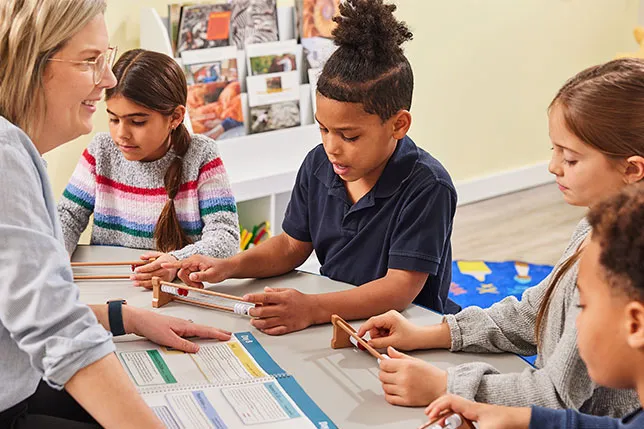
Research tells us that how students feel about math—and themselves as mathematicians—plays a significant role in how successful they are in math class. That’s important for administrators, teachers, families, support staff, after-school care providers, and everyone who interacts with students to keep in mind.
The connections between confidence, engagement, and success make logical sense based on our own life experiences. We tend to work harder and achieve more when we care deeply about what we’re doing and we’re good at it.
A Culture of Math Positivity
Math positivity is a term you’ve likely heard in conversations with colleagues. It describes a concerted effort to foster confidence, curiosity, and enthusiasm for math by reframing how we talk, teach, and think about skill development and achievement.
Math positivity is achieved through both culture and curriculum. It has several key components.
- Growth Mindset—teaching that math ability is developed through effort and practice. It is not a fixed trait one simply has or doesn’t have.
- Learning as a Process—creating an environment where struggle and mistakes are expected. Risk taking and errors are necessary stepping stones to learning math.
- Relevance and Application—helping students see and use math in real-world contexts. Math that relates to students’ interests and experiences is more meaningful.
- Positive Language—using phrases that encourage effort, progress, and perseverance in math. What we hear becomes what we believe.
- Collaboration and Community—establishing math classrooms where students support each other. Everyone’s input is valued, and everyone feels comfortable asking for help.
- Engagement—using hands-on tools, games, movement, storytelling, partner work, and other interactive teaching and learning strategies. These boost math understanding and are fun!
- Conceptual Understanding—moving beyond rote memorization to build deep, conceptual understanding of math. Focus on foundational skills such as number sense, procedural fluency, and proportional reasoning.
Math positivity requires systemic shifts in education culture, and change of that magnitude takes consistent and ongoing effort. It can, however, start with a single classroom or a few individuals.
We asked education changemakers across the country to share what they’ve done in their classrooms or districts that helped move the needle toward math positivity. Their responses fell largely into three categories: confidence, curiosity, and engagement.
Boost Confidence by Changing Mindsets
We’re All “Math People”
Perhaps you’ve seen memes, posters, and t-shirts circulating among educators that inspire math positivity with simple logic. “How to be a math person,” the joke begins. “Step 1: Do math. Step 2: Be a person.”
The key message is no joke, though. Whether we see ourselves as mathematicians or not has real impact on our performance.
Pam Woolard, math coach and interventionist at an elementary school in Heathsville, Virginia, explains, “Your brain looks for signs to validate what you tell it, so if you tell yourself you’re not a math person and you’re not good at math, then everything you do in class is going to validate that. You’re going to exacerbate every mistake you make, every bad grade you get.”
Instead, Woolard says, students need to see themselves as “math people” and believe that everyone has a math story. A math story is a powerful personal narrative based on memories, emotions, and experiences that are both positive and negative. It is shaped by internal and external forces. Most importantly, it’s not fixed.
When students believe that they are capable and that everyone is on a lifelong journey as a math learner, “Then they’ll start looking for signs to validate that,” says Woolard. “I think that’s our job as teachers, to point that out to them in different ways. . . we have to speak it into existence.”

Math Is Not a Gene You Inherit
Rachel Pehrson, math coach supporting elementary teachers in Granite School District in Utah, echoes the importance of believing you’re a math person. Her team works to change how families talk about math at home too—after repeatedly hearing parents say, “Oh, it’s okay. I wasn’t a math person either, so I don’t expect them to be a math person.”
Pehrson views these words as a teaching opportunity, a chance to help families understand the importance of how they talk about skills and learning at home. “We need to get to the point where we recognize math is not a gene. It’s not something we’re born with,” she stresses.
Normalize Mistakes and Not Knowing
To help students see and believe that everyone has a math story, we must embrace a growth mindset—not just for students but for ourselves too. We do that by modeling the way to respond when we make a mistake or don’t know something.
“The Wrong Is Where You Learn”
As a coach, Woolard helps teachers recognize ways to model a growth mindset in their existing routines. She notes that often means demonstrating that you’re human and make mistakes too.
“When you make a mistake on the board, you can say, ‘Oh, I made a mistake. Look at that! We all make mistakes. It’s okay if we learn from them.’ Then erase the board and fix it,” Woolard says.
It’s important that students know that mistakes are not only okay but also valuable in learning.
“Kids are afraid to be wrong,” she adds. “But the wrong is where you learn.”
Kids are afraid to be wrong. But the wrong is where you learn.
—Pam Woolard
Math Coach and Interventionist
Heathsville, Virginia
Let’s Find Out Together!
It’s also okay to simply not know things. That’s what Pehrson emphasizes when working with teachers. “Just like we don’t expect kids to know everything, we shouldn’t expect us as educators to know everything,” she says.
Pehrson surprises—and ultimately inspires—students by answering their questions, “I don’t know, but let’s find out together!” Or “I’ll look into that tonight, and I’ll let you know tomorrow.”
At first students were shocked to hear that the teacher didn’t know something, but ultimately the classroom became a community of learners curious about finding answers to all kinds of things together.
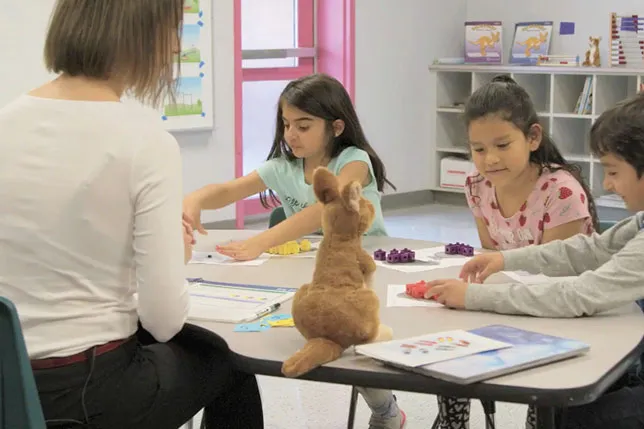
Increase Active Engagement
Who Owns the Math?
Jen Hunt, co-author of Kickstart programs for grades K–5 skills intervention, reminds us that engagement is as important as confidence and curiosity when the goal is math positivity and achievement.
Hunt is deeply interested in cognitive psychology, including how physical movement and multimodal activities build neural pathways and enhance retention. She frequently presents on these topics at regional and national education conferences.
“When kids own the math, they begin to see themselves in the math,” she says. Owning the math means doing the mathematical thinking—and talking.
“Whether it’s games or partner talk or number talks or students being active with their bodies with math. . .the more that students actively engage, the more they’re going to own the math.”
Hunt emphasizes the importance of hands-on materials and real-world opportunities for engagement—two things she intentionally built into Kickstart intervention programs for number sense, operations, and fractions. “A textbook is never going to create a positive math identity,” she explains. “That happens when students become owners of the math themselves.”
Summing It Up
Math positivity is multifaceted and isn’t something you achieve in a single interaction. But how we talk about and teach math has proven impact on students’ confidence, curiosity and motivation, and achievement. Here are some practical ways to effect change:
- Lead by example, eliminating phrases like “I’m not a math person” in favor of growth-minded alternatives like “I often struggled in math class.”
- Help families understand how you talk about learning in the classroom and why—and how they can reinforce or extend those ideas at home.
- Give yourself permission to make mistakes—and turn them into teaching moments.
- Look for curriculum and supplemental materials that actively engage students in mathematical thinking and conversation.
You May Also Like
